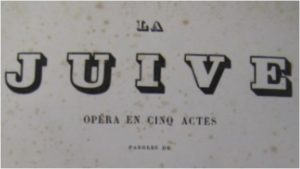
Opera Profile: Halevy’s ‘La Juive’
By Logan Martell« La Juive » premiered on Feb. 23, 1835 at the Opéra de Paris and remains the only one of Halevy’s to make a massivr impact. The work was widely admired during its early years and even Richard Wagner was said to have borrowed from portions of it.
The work was famously the last one to be performed by Enrico Caruso before his death. In the modern era, it has somehow disappeared from the standard repertoire and become more of a rarity and vehicle for certain tenors, such as Neil Schicoff.
Short Plot Summary
Eleazar, a Jewish goldsmith, has been caught working on a Church holiday. Before he can be lynched in accordance with the law, the mob’s attention shifts to the arrival of Cardinal de Brogni, who recognizes Eleazar, having sentenced several of the goldsmith’s sons to death for heresy some years prior. Rachel, Eleazar’s adopted daughter, is in love with a young man named Samuel, who is, unbeknownst to her, in fact Prince Leopold. The Prince is currently married to Princess Eudoxie, and risks excommunication if he is discovered to be having sexual relation with a Jew. Despite this, Samuel instructs his troops to keep order when the mob returns to attempt lynching Eleazar. Rachel invites Samuel over for the Passover, and while the young prince attends, he reveals himself as a Christian when he refuses to eat the unleavened bread he is given. While Rachel is shocked to learn this, the arrival of Princess Eudoxie forces Samuel to hide while she orders a jewel to gift to her husband. When the princess is gone, Samuel persuades Rachel to run away with him, she is about to accept when Elezar returns, condemning their relationship and driving Samuel away.
After following her lover to the palace, Rachel ends up in the service of Princess Eudoxie as her maid. When Eleazar arrives to deliver the order to the princess, both he and Rachel recognize Prince Leopold as Samuel; Rachel reveals before those gathered how she was seduced by him, leading to all three being arrested. In prison, Rachel and Eleazar are visited by the princess and Cardinal Brogni, respectively. While the princess is able to get Rachel to agree to withdrawing her accusation against Leopold, Eleazar refuses Brogni’s offer to avoid execution by converting to Christianity. At this time, the goldsmith decides to reveal to his enemy that Brogni’s infant daughter, who was presumed dead when Brogni’s house was torched, was actually saved and raised in secret by a Jew, and he is the only person who knows her identity. Though Eleazar savors the pleas of the cardinal, he realizes that taking this secret to the grave as he intended would result in Rachel being executed. Though he chooses to save her life, he hears the public execution of Jews in the street , seeing it as God’s will that he and his daughter die in allegiance with their faith. The father and daughter are brought to the gallows, where they are to be killed in a cauldron of boiling water. Eleazar tells his daughter she will be spared if she converts to Christianity; not only does she refuses but she hurries up the gallows to throw herself in the cauldron. When Cardinal Brogni tries one last time to learn where his daughter could be, Eleazar reveals she lies dead in the boiling cauldron, devastating the cardinal before going to his own death.
Watch and Listen
Here is a recording with Neil Schicoff and Krassimira Stoyanova from 2003.
Categories
Opera Wiki

